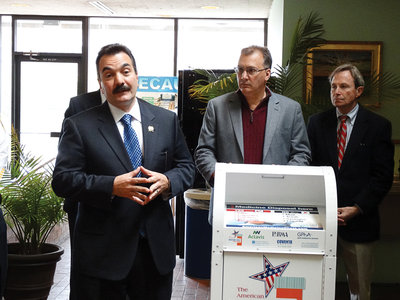“Each day in New Jersey we lose two family members to opiate abuse,” said Angelo Valente, executive director of Partnership for a Drug-Free New Jersey. “It’s an issue that we’ve seen grow to epidemic levels in the state of New Jersey. And one of the ways we are going to be able to reverse these trends is through education.”
He was speaking at a press conference earlier this month at the Secaucus Town Hall to announce the installation of a drug dropbox in the lobby of the police station, where families can properly dispose of unwanted pharmaceuticals so they don’t fall into the wrong hands.
Mayor Michael Gonnelli said that when the dropbox was opened the morning of the press conference, 38 pounds of prescription drugs were removed that had been deposited by members of the public.
“The education component is much needed,” said Tom Allen, CEO of Summit Behavioral Health, a drug and alcohol treatment provider. “I keep hearing time and time again from my clients that they’re being exposed to prescription drugs not from a pusher on the street or in their schools, but from their mom and dad’s medicine cabinet. Dental work that was done a year ago and mom left a prescription there for 30 Vicodin and forgot all about it, and that’s where the kids are more becoming exposed.”
“When people flush their medicines down the toilet, that actually goes into our waterways.” – Vincent Prieto
____________
Opiates are defined as any sedative or narcotic drug prescribed for relieving pain or inducing sleep.
“You need to be cognizant of what you have,” said Assemblyman Vincent Prieto about the contents of people’s medicine cabinets—especially when there are children or young adults in the home. “You need to make sure they’re in a safe environment.
“You hear stories of prescribed medications and addiction and broken families,” he added. “Disposing of medicines is very important.”
While disposal of unwanted medications is critical so they don’t become subject to abuse, the method of disposal is also important.
“When people flush their medicines down the toilet, that actually goes into our waterways,” said Prieto. “It’s more pollutants. And when you throw it out in the garbage it goes into dumps. People don’t really realize that there are bigger consequences.”
A drug abuser speaks up
Tom Allen describes himself as a “person in long-term recovery from opiate pain medication.” He founded Summit Behavioral Health after suffering serious personal problems from his own addiction to drugs.
“I was addicted to pain pills,” he said. “I was a former attorney, working at a large firm in New Jersey. I hurt my neck in law school and was prescribed pain pills for the injury. And it just progressed from first taking the pills as needed and then taking multiple pills from multiple doctors and multiple pharmacies. Things came to a head. I got a job at a big firm and in six months was asked to resign because of… erratic behavior, I guess is putting it nicely.”
Recognizing he was out of control, Allen took steps to remedy the situation. “I was one of the lucky ones,” he said. “I had good health insurance and I was able to seek quality treatment and through a long process I was able to find recovery.”
After becoming involved in running a treatment center in Arizona, the Philadelphia native moved back to New Jersey where he and his wife had family. Here he got a job in a treatment center for individuals with drug problems.
“I saw that there was this huge treatment gap in the state and that we needed more treatment options. I was seeing all these young adults dying of prescription drugs. I went to eight funerals in an 18 month period.”
Assembling a team of partners, Allen opened the first of four outpatient centers, with a 40-bed residential detox scheduled to open on May 15 in Union.
38 pounds of drugs
“The Partnership for a Drug-Free New Jersey is 22 years in New Jersey,” said Valente. “It’s the largest continuous public service campaign in the state’s history.”
The Secaucus dropbox is the 80th location in the state and one of over 1,000 across the country. Underwritten by the pharmaceutical company Activis, it was installed in the fall of 2013.
“It’s a pleasure to have this in our community,” said Gonnelli. “Not only for Secaucus but for all of Hudson and lower Bergen County.”
The dropbox is available 24 hours a day in the police station.
“Like any other drugs, we’re responsible for every piece that’s in there and the disposal,” said Detective Michael Torres, who is in charge of the dropbox.
After the drugs are collected, “We go through a company, Covanta,” said Torres. “They’re a disposal company. They have several places for disposal. The one we’re utilizing is in Essex county.”
Covanta incinerates the prescriptions.
Art Schwartz may be reached at arts@hudsonreporter.com.
